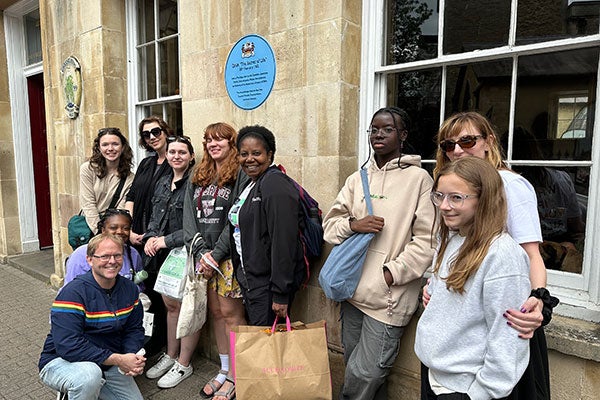Learning London’s literary traditions
A group of eight students in Dr. Will Banks and Dr. Andrea Kitta’s summer study abroad classes saw 20 plays as part of a three-week tenure in London.

Dr. Andrea Kitta and study abroad students stand outside the blue plaque marking the discovery of Franklin, Watson and Crick of the double helix structure of DNA in 1953. (Contributed photo)
According to Banks, the course theme, “Monsters and Magic,” was part of two classes designed to focus attention on how much understanding of the world is shaped by what we think is “real” and “supernatural,” a framework we develop as children and refine as we grow up.
“While we often think of monster and magic as childish fun, we carry those concepts into adulthood, where we too easily render anything unlike us as monstrous without really trying to understand difference, and where we struggle to make important decisions about our health and well-being because we see science seemingly at war with ‘common sense’ and folk knowledge,” said Banks.
Students studied the literary and cultural traditions of the United Kingdom, represented in theater, fiction, poetry and folklore of London. As part of the class, students attended 20 plays and musicals and took group trips to Cambridge University, Kew Garden and the London Dungeon. They also had the opportunity to make weekend trips to destinations including Stonehenge, Oxford University and the Wizarding World of Harry Potter.
Emma Stewart, a senior speech and hearing sciences major from Coats, enjoyed exploring different parts of the city.
“Some of my favorite memories from the trip came from me taking the tube (subway) to different neighborhoods in London and just walking around. I found many cool shops, restaurants and experiences that way,” said Stewart.
The students came together as strangers but returned from the trip as friends, having made connections and formed bonds that will last beyond the three weeks in London.
“None of the students knew each other before the trip,” said Banks. “One of the things that makes summer study abroad so magical is that, like summer camp, you build connections quickly and those bonds go deep. I’ve been doing this trip every summer since 2008 and to this day, students who met on the trips each year remain close to each other.”
Stewart became fast friends with her roommate and others on the trip.
“I didn’t know any other students before going on the trip; however, I was surprised at how quickly I became friends with my roommates,” she said. “Our shared experiences in London helped us get closer, and I know these friendships will persist long after the trip.”
As part of the class, students were required to write reflective essays about what they learned on the trip. Banks found that the student essays reflected thoughts on class experiences as well as their own.
“With the assignment, we hoped that students connect the plays, excursions and discussions to London and its history and culture,” said Banks. “They did that, but overwhelmingly they wrote about how much the trip had given them confidence and decreased their travel anxieties, about doing things on their own with a parent or close friend nearby to help. I love that study abroad creates such a powerful space for that personal growth.”
Stewart feels she experienced the growth that Banks described.
“As a student, I learned how to find the connections between what we discussed in class, the reading, the shows we saw and our experiences in London. As a person, I noticed a big increase in my confidence from the beginning of the trip to the end.”